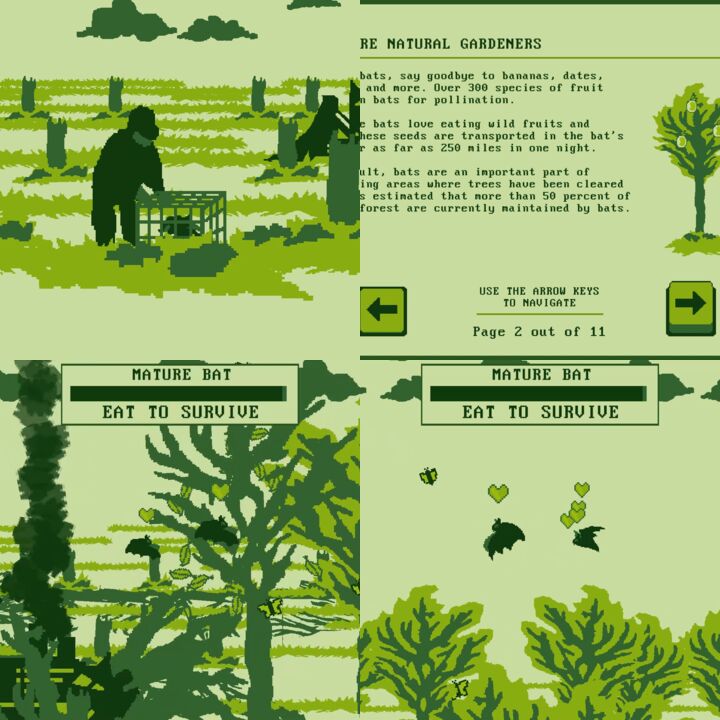Night Flyer: A Bat's Journey
The Problem
With the ongoing COVID-19 being attributed to bats in the media, public backlash for these animals have reached an all time high. Animal conservation efforts are being challenged as misinformation and fear lead to the killing of bats in the wild. Throughout history, bats have been demonized, feared, and killed for causing human problems, however it's quite the opposite. Many of the issues attributed to bats actually stem from human deforestation and wildlife trading. Through this close interaction, humans put themselves directly into the bats' natural home, increasing the chances that zoonotic diseases can spread. Bats play a crucial role in pollination and pest control, while providing reforestation and natural maintenance of the ecosystem. With over 1,400 species of bats, bats make up over 20 percent of the mammal population. Without bats, the planet's ecosystem would suffer greatly. Fruits such as mangoes, nuts, and bananas are all pollinated by frugivore bats. Insectivore bats can eat up to 1,200 mosquitos a night, acting as a natural deterrent to diseases including Zika and West Nile. The International Union for the Conservation of Nature list 128 species of bats as Critically Endangered or vulnerable, however, the over 224 species are marked "Data Deficient" meaning there is not enough information on these species. Bat Conservation International states, bats "are among the most under studied of mammals" by researchers.
Our Proposal
Animal conservation organizations including BatCon International and the U.S. Fish and Wildlife have done tremendous work in education and outreach programs, but shifting negative public perception of bats around the world is a major challenge. Video Games provide an opportunity to directly engage, entertain, and education audiences in an immediate way. Over 164 million adults in the United States play video games and three-quarters of all Americans have at least one gamer in their household. In order to counter misinformation and negative media perception of bats, my approach is to create a video game that highlights the life of a bat in nature. In "Night Flyer," you start as a young bat and go through life, finding food, finding love, until one day, deforestation threatens your survival. Through engaging audiences with a playful, yet emotional story, the gameplay will humanize the animal's experience with empathy. Players are emotionally challenged by the real dangers of deforestation and will finish the game with an understanding of the ecosystem, along with human caused problems. Night Flyer is currently a small v1.0 prototype created in four days. However, this project is planned to be fully expanded upon. With proper funding, the narrative, gameplay, audio, and visuals will be greatly enhanced. Key goals for this project include: examining illegal wildlife trading, the effects of urbanization on animals, and the results of new technologies on natural habitats.
We Assume that...
We assume that games can be attributed to educational goals.
We assume that games are an accessible medium for people.
We assume that online technology allows easier access to video games.
Constraints to Overcome
The purpose of this game is to counter negative public perception of bats and to bring positive awareness on how animals impact our ecosystem. This goal can be achieve through proper distribution channels for the game, with museums, zoos, and schools being at the forefront. As educational games in the past have failed with mainstream gamers, this game seeks to remedy that by focusing on gameplay mechanics and visuals, the root for "core" gamers. In an international context, access to the game must be easy. As of now, online distribution is the most important way that this project can reach people. In certain communities, a lack of reliable internet access or digital technology must also be addressed. In this case, a more novel approach must be taken in the form of on-site animal educators with access to the game. The game must be localized in a way that it follows the laws, regulations, and social customs of each country and to counter any stigma against educational gaming.
Current Work
Night Flyer, version 1.0, is available to test over the internet in any online web browser.Currently, playing online is the only way to access the game. The next step will be to get it ready for mobile browsers and develop off-line versions of the project. In the case of limited internet access, the game could be downloaded ahead of time and played without the internet. A downloaded app can then be distributed by computers, phones, or tablets that contain the game file. The narrative and gameplay will also be greatly expanded upon. Key goals for the future include: examining illegal wildlife trading, the effects of urbanization on animals, and the results of new technologies on natural habitats. There will also be additional research conducted with scientist and educators, creating gameplay scenarios to match real life issues that need to be addressed.
Current Needs
The project is currently hosted on itch.io, a free marketplace for games, however, in order for the game to have maximum impact, it will need to expand into other distribution channels. This includes Steam, iOS, and Android platforms. I am also considering major gaming platforms owned by Nintendo, Microsoft, and Sony. Collaborating with a major publisher might be one step to help spread visibility. This requires more expertise in the technical side of online distribution for major platforms, along with proper funding to distribute on those platforms. In terms of funding, the major hurdle are negotiating licensing fees for the development programs used and to negotiate with each platform's cost to publish. There will also need to be a balance between production cost and educational goals as the project expands in scale.
